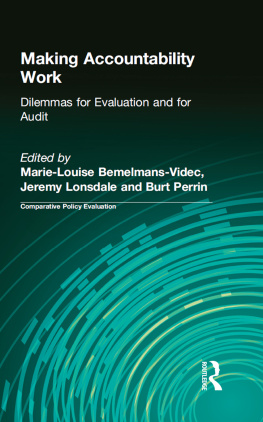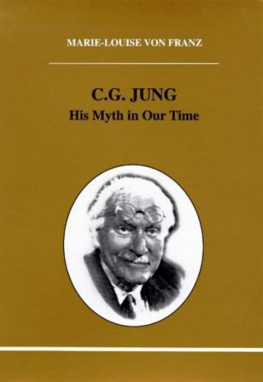Making Accountability Work
Comparative Policy Evaluation Series
Ray C. Rist, series editor
Program Evaluation and the Management of Government
edited by Ray C. Rist
Budgeting, Auditing, and Evaluation
edited by Andrew Gray, Bill Jenkins, and Bob Segsworth
Can Governments Learn?
edited by Frans L. Leeuw, Ray C. Rist, and Richard C. Sonnichsen
Politics and Practices of Intergovernmental Evaluation
edited by Olaf Rieper and Jacques Toulemonde
Monitoring Performance in the Public Sector
edited by John Mayne and Eduardo Zapico-Goi
Public Policy and Program Evaluation by Evert Vedung
Carrots, Sticks, and Sermons: Policy Instruments and Their Evaluation
edited by Marie-Louise Bemelmans-Videc, Ray C. Rist, and Evert Vedung
Building Effective Evaluation Capacity
edited by Richard Boyle and Donald Lemaire
International Atlas of Evaluation
edited by Jan-Eric Furubo, Ray C. Rist, and Rolf Sandahl
Collaboration in Public Services: The Challenge for Evaluation
edited by Andrew Gray, Bill Jenkins, Frans Leeuw, and John Mayne
Quality Matters: Seeking Confidence in Evaluation, Auditing, and Performance Reporting
edited by Robert Schwartz and John Mayne
From Studies to Streams: Managing Evaluation Services
edited by Ray C. Rist and Nicoletts Stame
Open to the Public: Evaluation in the Public Arena
edited by Richard Boyle, Jonathan D. Breul, and Peter Dahler-Larsen
Making Accountability Work
Dilemmas for Evaluation and for Audit
Comparative Policy Evaluation, Vol. 14
Edited by
Marie-Louise Bemelmans-Videc,
Jeremy Lonsdale and Burt Perrin
With a foreword by Amitai Etzioni
First published 2007 by Transaction Publishers
Published 2017 by Routledge
2 Park Square, Milton Park, Abingdon, Oxon OX14 4RN
711 Third Avenue, New York, NY 10017, USA
Routledge is an imprint of the Taylor & Francis Group, an informa business
Copyright 2007 by Taylor & Francis
All rights reserved. No part of this book may be reprinted or reproduced or utilised in any form or by any electronic, mechanical, or other means, now known or hereafter invented, including photocopying and recording, or in any information storage or retrieval system, without permission in writing from the publishers.
Notice:
Product or corporate names may be trademarks or registered trademarks, and are used only for identification and explanation without intent to infringe.
Library of Congress Catalog Number: 2007017718
Library of Congress Cataloging-in-Publication Data
Making accountability work : dilemmas for evaluation and for audit /
Marie-Louise Bemelmans-Videc, Jeremy Lonsdale, and Burt Perrin, editors.
p. cm.(Comparative policy evaluation series)
Includes index.
ISBN 978-0-7658-0399-3
1. Policy sciencesEvaluation. 2. AuditingEvaluation. 3. AuditingLaw and legislation 4. Public administrationEvaluation. 5. Evaluation. I. Bemelmans-Videc, Marie-Louise. II. Perrin, Burt. III. Lonsdale, Jeremy.
H97.M363 2007
352.3'5dc22
2007017718
ISBN 13: 978-0-7658-0399-3 (hbk)
Jeremy Lonsdale and Marie-Louise Bemelmans-Videc
Marie-Louise Bemelmans-Videc
Burt Perrin
John Mayne
Jeremy Lonsdale
Peter Wilkins and Jeremy Lonsdale
Tom Ling
Andrew Gray and Bill Jenkins
Peter van der Knaap
John M. Owen
Mita Marra
Eduardo Zapico-Goi
Burt Perrin, Marie-Louise Bemelmans-Videc, and Jeremy Lonsdale
The editors wish to dedicate this, the 14th book in the Comparative Policy Evaluation Series of Transaction Publishers, to Dr. Ray C. Rist, Series Editor. Ray has been a friend and colleague to each of us over many years and has provided invaluable support to the creation of this book as well as in many other ways. Until recently he was Senior Evaluation Officer with the Operations Evaluations Department of the World Bank, acting as an advocate for evaluation to individuals and governments around the world. Previously, he has held senior positions in both the legislative and executive branches of the United States government, as well as teaching positions at Cornell University, The John Hopkins University and George Washington University.
20 years ago, Ray Rist founded the International Evaluation Research Group (INTEVAL). It is a tribute to his never failing commitment and leadership to the group, his inspiration and encouragement to all its members, and most important of all, his unconditional friendship, that so many have stayed with it over so many years, bringing their very best to the discussions and writings that characterize the groups efforts. Those who are lucky enough to have worked with him always have taken away something valuable from the contact.
The INTEVAL Group serves both as a forum for international scholars and practitioners of public policy to discuss ideas and developments in the fields of evaluation and audit, and as a community dedicated to enhancing the contribution of evaluation to government. Since the late 1980s, it has been responsible for the books listed on page ii of this volume that have been published under Transaction Publishers Comparative Policy Evaluation Series. Recent topics addressed by this series include: the changing nature of evaluation and of evaluative systems in an environment of globalization; how approaches to evaluation vary across different countries; how to ensure quality in evaluation and audit; and the challenges for evaluation and audit resulting from the increasing use of collaborative arrangements in public services. None of this would have been possible without the leadership and support demonstrated by Ray Rist.
Marie-Louise Bemelmans-Videc
Jeremy Lonsdale
Burt Perrin
Amitai Etzioni
Accountability deserves much more attention than it has been getting; the book before us makes a major contribution to highlight its importance. It sounds like a dull subject, something having to do with annual reports and accountants. Actually at the heart of the matter is ensuring that actions are carried out in line with legitimate policies, those set by law, in line with ethical precepts, and properly authorized by a legislature or corporate board and executive.
The importance of accountability can be highlighted by paying mind to the frequent attention paid to the need for balance between individual rights and public safety and health. I use this key area to illustrate the importance and ways of accountability, public accountability, for the rest of this foreword. The book itself provides numerous other areas in which accountability is or ought to be studied and expanded.
When the polity tilts too far toward either safety or rights, the imbalance should be corrected. Accordingly, we must determine how the balance is affected by new technologies. Liberalizing technologies have greatly hindered the work of public authorities in the area of communications surveillance. On the other hand, new protective technologies have offset these difficulties to some extent. New legislation that adapted old laws to the new technologies has further lessened these obstacles. Finally the September 11th attack on America changed the point or zone1 of balance by posing a new, credible threat to public safety and health. The question remains whether the new technological and legal measures enhance public safety to the extent needed or excessively intrude into individual rights.














